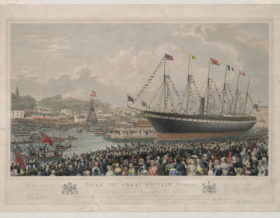Ireland’s uprising (1798)
By the late 1700s, many Irish people were deeply frustrated by their colonial status and limited representation in parliament. Inspired by the American and French revolutions, in 1798, the ‘United Irishmen’ – a mixed group of Protestant and Catholic radicals – made a concerted effort to drive through a fully fledged anti-colonial movement and rose up in an armed rebellion against British rule. The British responded brutally, supressing the rising. In 1800, the Crown presided over a landmark union of the British and Irish Parliaments to create the United Kingdom of Great Britain and Ireland – a move which drew on sectarian impulses and buried resentments not far below the surface. The Irish uprising served both to expose contemporary troubles in the 1790s, and in its course and consequences, to signpost future troubles to come – troubles with which the United Kingdom, Ireland, and Europe still contend.







